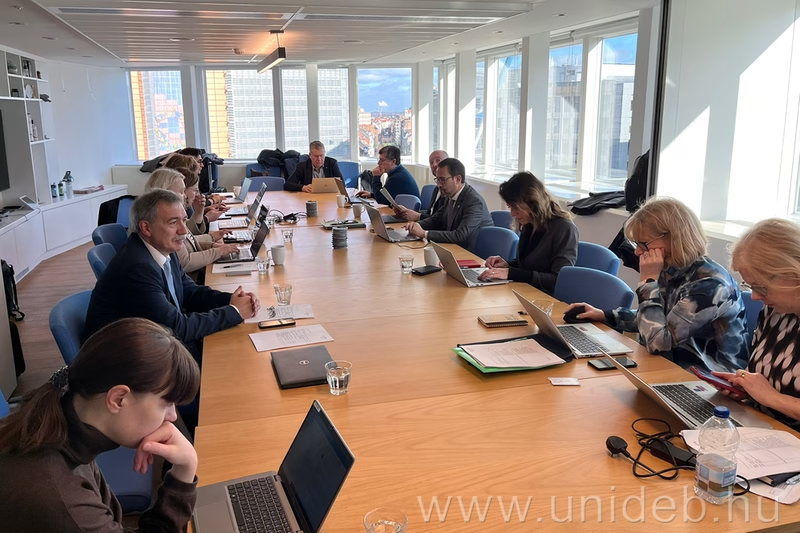
Enhancing International Cooperation in Higher Education: Insights from the University of Debrecen and the CARPE Consortium
The University of Debrecen, one of Hungary’s leading institutions of higher education, actively engages in international collaborations to advance research, innovation, and academic excellence. A recent highlight of this commitment was its participation in the CARPE (Consortium on Applied Research and Professional Education) governing body meeting held in Brussels. This gathering exemplifies how universities are forging strategic partnerships across Europe to develop joint projects and share best practices in applied research and professional education.
What is the CARPE Consortium and Why Does it Matter?
The CARPE consortium was established in 2011 by notable European universities that specialize in applied research and professional education. With members from cities like Hamburg, Utrecht, Valencia, Turku, Glasgow, and Porto, the consortium emphasizes collaboration outside of capital city centers, promoting regional development and innovative scholarship. Since 2015, the University of Debrecen has been a vital member, contributing to its goals of fostering applied research and strengthening academic networks.
Participating in CARPE allows universities like Debrecen to engage in joint EU projects, share resources, and develop collaborative programs that benefit students, researchers, and faculty members alike. This strategic alliance supports the university’s broader aim of becoming a prominent player in European higher education and research.
Highlights from the Recent CARPE Governing Body Meeting
Held in Brussels, the meeting was attended by prominent representatives, including László Csernoch, Deputy Rector for Research and Education at the University of Debrecen, and Scientific Director Zsolt Varga. The event focused on discussing upcoming funding opportunities, particularly through European initiatives such as the Smart Cities projects and the European Universities Alliances.
One of the key presentations was delivered by László Csernoch, who introduced the Pannonia Scholarship Program. This new scholarship scheme aims to facilitate international mobility and cooperation among consortium members, providing additional support for research and joint educational initiatives. Such programs are crucial for fostering cross-border academic projects and enabling students and staff to benefit from diverse research environments.
Strategic Directions: The Future of European Higher Education Collaboration
The meeting underscored the importance of building networks and joint research initiatives within higher education institutions. The participants reaffirmed that the future of European universities lies in effective collaboration, not only to secure funding but also to address global challenges such as sustainability, digital transformation, and social inclusion.
Furthermore, discussions focused on upcoming projects to be coordinated during the next period, including planning for the 2025 CARPE Conference in Porto. This event will serve as a platform for faculty members from Debrecen and other institutions to exchange ideas and showcase innovative research outcomes across diverse fields—from humanities and health sciences to engineering and environmental studies.
Projects and Fields of Cooperation Enabled by CARPE
Within the framework of CARPE, the University of Debrecen has already been involved in multiple EU-funded projects across various faculties. These projects aim to promote social inclusion, sustainability, transport development, and data management—areas critical to addressing contemporary societal issues.
Faculties such as Humanities, Health Sciences, Economics, Informatics, Agriculture, and Engineering actively participate in these collaborations. Such multidisciplinary engagement demonstrates Debrecen’s commitment to applying research for societal impacts and international development.
Implications for Students and Researchers
Participation in international consortia like CARPE offers significant opportunities for students and researchers. It enables access to shared resources, joint research funding, and international mobility programs. These experiences enhance academic profiles and prepare participants for careers in a globalized job market.
For students, scholarships like the Pannonia Scholarship Program open pathways to study abroad or engage in joint research projects. For faculty, collaborative projects lead to publications, innovative teaching methods, and increased visibility in the European research community.
Strengthening Hungary’s Role in European Higher Education
The University of Debrecen’s active involvement in the CARPE consortium exemplifies Hungary’s commitment to integrating into the broader European higher education landscape. Through strategic partnerships, innovative research projects, and support programs like the Pannonia Scholarship, Debrecen is advancing its mission to provide high-quality education and impactful research.
Looking to study in Hungary? The University of Debrecen offers top-ranked degree programs, vibrant student life, and exciting opportunities for international students. Fill out the form and get guidance from expert counselors every step of the way.

